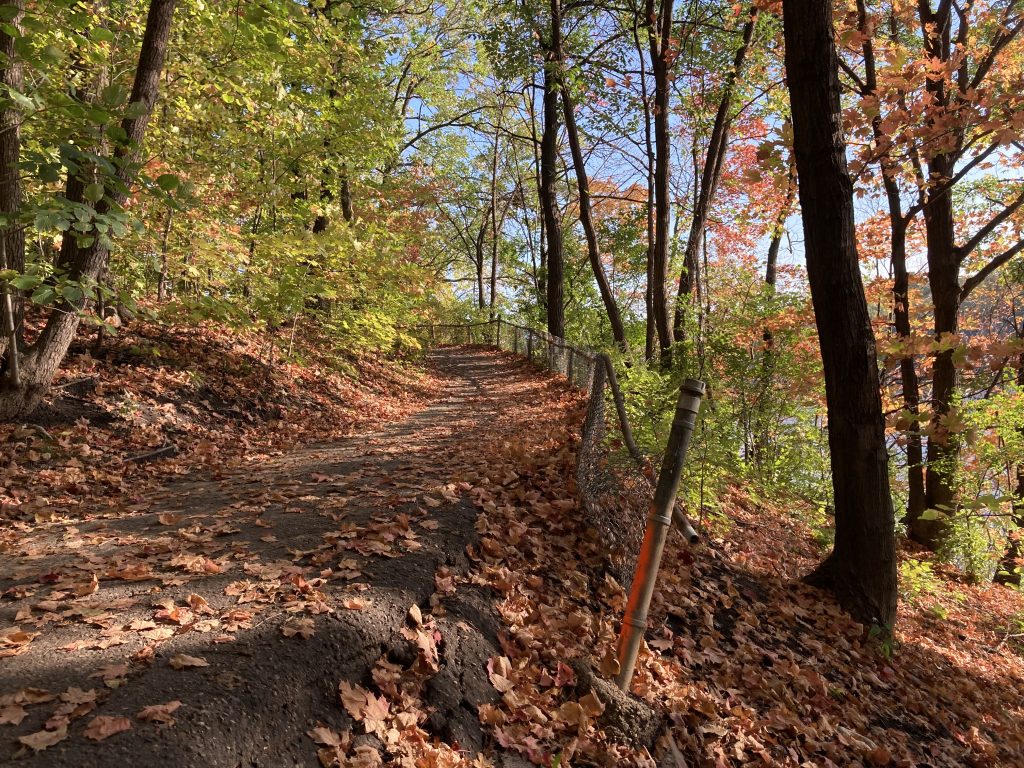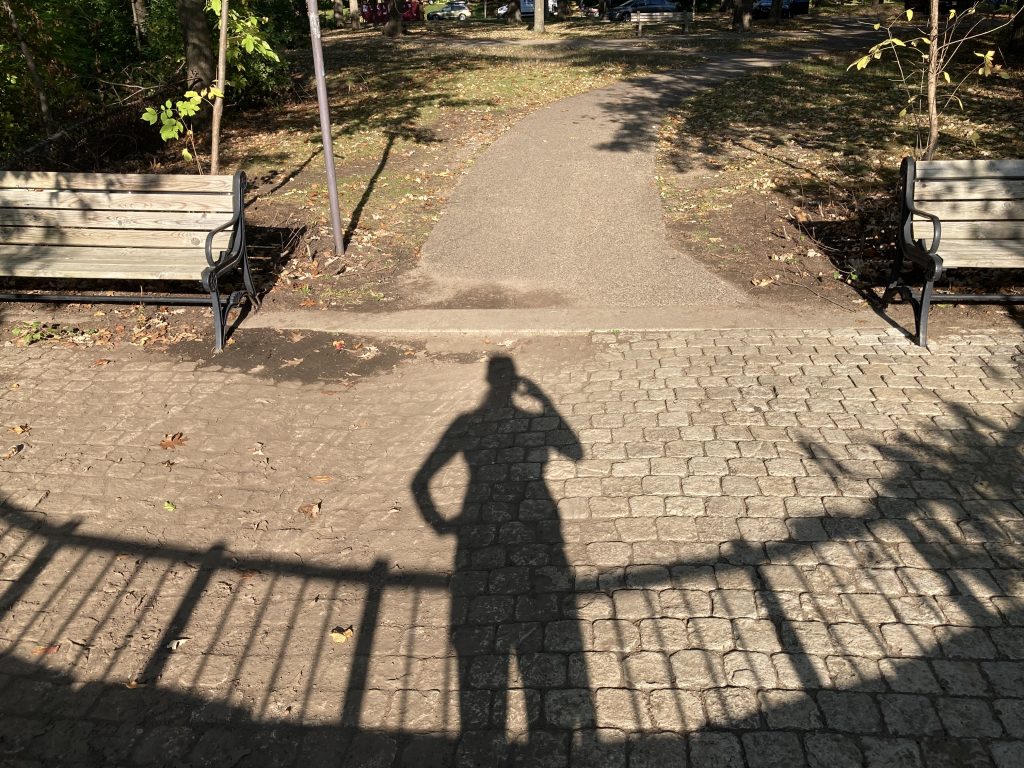35 minutes
Drs. Dorothy and Irving Bernstein Scenic Rest Area*
52 degrees
*This is the first time, after almost 10 years of living here that I recall reading the sign at the 35th street parking lot overlook. After a quick search, I couldn’t determine who Dorothy and Irving are and what type of doctors they were.
What a wonderful spring day. High of 64 and sun! Such a strange time. Winter hardly happened. The snow total this year: 7.3 inches. Last year: 89.7.
see: The Lost Winter
I miss the crunching snow and the cold air and the big flakes hitting my face and layers and running on ice without slipping and snow walls and desolate river views. And, I’m happy to see spring early — to hear more birds, wear less layers, sit on the deck, open the windows.
Once we reached Drs. Dorothy and Irving Bernstein Scenic Rest Area, we took the gravel path down and around the ravine: a shelf of snow and slick slats on the grate over the seeping water. Otherwise, mostly dry and without mud. Walking back through the neighborhood we noticed some birds — first, their tin-whistle song, then their fleeting forms fluttering across the thin branches. Could I turn this into a part of my bird triptych poem? At first we thought they might be blue jays, but then settled on robins. Did Scott see that they were robins? Not me. All I saw was a small, but not too small form, up in the trees. Mostly, quick, darting movement, then flight, once, hovering on a high-up branch.
Before the walk I wanted to archive two sources:
to archive
james schuyler and color: Reading a past entry from march 11, 2023, I was reminded of James Schuyler and his wonderful use of color. I had forgotten that he was an art critic. Searched, “james schuyler ekphrasis” and found this LARB review of a then recent book (circa 2011) of Schuyler’s poems: Scrappiness. The review gave a lot of attention to one of the poems, which is about a painting, but (maybe?) not an ekphrasis: A Blue Shadow Painting. Here are some color lines I’d like to remember:
It’s like this: the orange assertions, dark there-ness
of the tree, malleable steel-gray blueness of the ground; and sky;
set against, no, with, living with, existing alongside and part of,
the helter-skelter of rust brown, of swift indecipherables. The day
is passing, is past: mutable and immutable, came to live,
on a small oblong of stretched canvas. Blue shadowed day,
under a milk-of-flowers sky, you’re a talisman, my Calais.
another line to remember: Not Make it new, but See it, hear it freshly.
listen to the full poem: A Blue Shadow Painting, audio
charles simic: I found a link to this article — Charles Simic and Me/ Dana Levin — on poems.com the other day. I like the brevity of Simic, at least what I’ve read in The New Yorker.
Williams used to say that he could revise a poem twenty different times just by changing the line breaks.
Charles Simic and Me / Dana Levin
Reading this, I immediately thought of an essay I read a few years back: Learning the Poetic Line/ Rebecca Hazelton. I’d like to reread it, and practice its 6 S’s. But — what are some ways other than line breaks to shape the story? Are these line breaks too visual, only achieving their effect when read with eyes and not ears? How can I represent line breaks in a way that resembles how I see? And/or what, other than line breaks, can I use to represent how I find/make/experience the world?
and is more interesting than but
Simic practiced this philosophy of and in all his poems, a metaphysics of radical inclusion: brutality and death were everywhere in life, and they were ordinary.
Charles Simic and Me/ Dana Levin
the real task, for him [WCW], was not to chronicle the development of knowing but to enact, via enjambment, the struggle of seeing—and so to find himself asking the reader to participate in that struggle too, to work with him in empathy?
Charles Simic and Me/ Dana Levin
the struggle of seeing — asking the reader to participate in that struggle too
poems as made things—products of decision, as much as magic
What a wonderful, thought-provoking essay! I think one of the problems with my Haunts poems are the line breaks and the music of the words? I’m using the breathing rhythm of 3/2, but do they all need to fit that strict form? How can the 3/2 feeling being played with in the lines? Adhered to, but in new ways? Yes! I will work on line breaks today and try to see my poems in not new, but fresh ways!
Found this Charles Simic poem in his collection, The Lunatic. My answer to his questions: yes, I have.
Late-Night Inquiry/ Charles Simic
Have you introduced yourself to yourself
The way a visitor at your door would?
Have you found a seat in your room
For every one of your wayward selves
To withdraw into their own thoughts
Or stare into space as if it were a mirror?
Do you have a match you can light
To make their shadows dance on the wall
Or float dream-like on the ceiling
the way leaves do on summer afternoons,
Before they take their bow and the curtain drops
As the match burns down to your fingertips?

